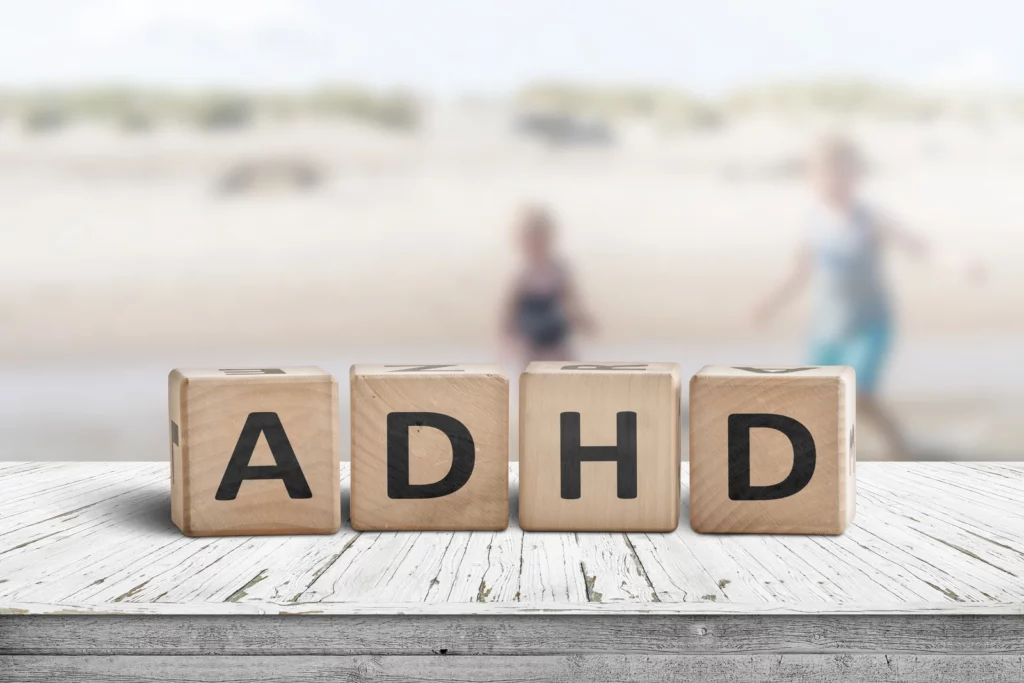Announcement
This article will help explain the distinct characteristics and nuances of OCD and ADHD, shed light on their overlapping symptoms, and emphasize the importance of proper diagnosis and treatment for individuals presenting with these conditions.
Introduction
If you or someone close to you is starting to display symptoms of a mental health disorder, it can be difficult to tell what the problem is. Parents of children who are struggling in school might ask, “What is the difference between OCD and ADHD?” while adults might ask, “Do I have ADHD or OCD?”
With a professional mental health consultation, you can receive a diagnosis and learn about the distinct characteristic differences between OCD and ADHD, as well as how symptoms might overlap. Understanding the differences and similarities between OCD vs. ADHD can make it easier to determine when to get treatment and what type of treatment is best.

What is ADHD?
ADHD is considered a neurodevelopmental disorder. This group of mental health conditions usually manifests during early stages of development, often before a child starts school. It’s not uncommon for neurodevelopmental disorders to co-occur.
Children with ADHD commonly have another specific learning disorder or behavioral disorder, such as Oppositional Defiant Disorder or OCD.
What is OCD?
OCD is part of a category of mental health disorders that have to do with obsessions and compulsions. It is the primary condition within the group of related disorders.
OCD is a condition where individuals are overwhelmed by obsessions (persistent and unwanted thoughts, urges, or mental images) and/or compulsions (persistent and unwanted behaviors).
This condition, unlike ADHD, usually manifests in adolescence or adulthood, and symptoms can come and go regularly throughout your lifetime.
For some people, OCD is characterized by things like opening and closing a door six times each time or constantly picking at skin. These obsessions or compulsions are preoccupying and significantly disrupt daily function.
| OCD | ADHD | |
| Symptoms | – Obsessions – Compulsions | – Trouble staying focused – Talking or fidgeting too much – Disruptions – Disorganization |
| Causes | – Genetics – Environment – Brain abnormalities | – Environmental risks during pregnancy Brain injuries |
| Common misdiagnosis | – Generalized anxiety disorder | – Bipolar disorder |
| Treatment | – Therapy – Medication | – Therapy – Medication |
ADHD vs. OCD Diagnostic Criteria
Is there an ADHD and OCD difference? How can you tell if you have ADHD or OCD?
ADHD
For ADHD to be diagnosed, children or adults must demonstrate a persistent pattern of symptoms that interfere with their daily function or development:
Inattention
There are two main characterizations, the first of which is inattention. Inattention comes in several forms, and receiving a diagnosis of ADHD only happens if a client has six or more of the symptoms for at least six months, severe enough to interfere with daily life and not explained by any other condition:
- People often overlook or miss details and make mistakes during school, work, or personal activities.
- People can’t stay focused on things like reading a long article, talking to someone else, or listening to a lecture and often look for an immediate reward like being the person who is talking.
- People always seem distracted and are never really listening when spoken to, or they might walk into the street without looking.
- People start tasks but don’t finish them.
- People have problems with organization, managing any task that has to be completed in a specific sequence, managing time, meeting deadlines, and keeping materials for work or school in order.
- People often avoid tasks like completing forms, preparing reports, or doing homework if they take a lot of sustained focus.
- People often lose things they need, like phones, glasses, wallets, tools, keys, books, or school items.
- People get easily distracted either by unrelated thoughts or environmental stimuli.
- People are often forgetful about daily things like returning calls, running errands, doing chores, paying bills, or keeping appointments.
Hyperactivity and Impulsivity
The second characterization is hyperactivity and impulsivity. Again, a formal diagnosis happens if a client has six or more of the symptoms below for a minimum of six months, not explained by other things:
- People often fidget or are physically restless.
- People often get up from their chairs when they should otherwise be seated.
- People who run or climb a lot, or have extreme restlessness.
- People who cannot engage in quiet activities in their free time.
- People who get uncomfortable staying still and need to move a lot.
- People who talk excessively.
- People who interrupt others and cannot wait for others to talk in a conversation.
- People who cannot wait patiently, like in lines.
- People who interrupt others regularly, like intruding into activities others are doing or using someone else’s things without permission.
For ADHD, many of these symptoms are typically noticeable before a child turns 12, and they are persistent no matter where someone is, whether they are at home, at work, or in school. These symptoms must be severe enough to interfere with or, at the very least, reduce daily activity quality and function.

OCD
For OCD to be diagnosed, individuals need to struggle with obsessions and/or compulsions.
Obsessions
Obsessions are things like persistent images, thoughts, or urges that are unwanted and cause severe distress or anxiety.
Individuals who struggle with OCD might try to ignore them, suppress them, or make them go away by performing compulsive behavior.
Compulsions
Compulsions refer to repetitive actions or mental actions that an individual believes they absolutely have to perform in accordance with specific rules. These compulsions might be designed to reduce anxiety or prevent something from happening, but in reality, they do neither.
Compulsions can include:
- Muttering words repeatedly under the breath
- Counting
- Praying
- Ordering
- Checking
- Turning things on and off (like lights)
- Locking and unlocking (like windows or doors)
- Hand washing
One difference between ADHD and OCD is that OCD compulsions or obsessions usually take at least one hour per day, and this time-consuming nature causes significant impairment in terms of:
- Daily function
- Work or school performance
- Relationships
- Social engagement
With OCD there are also three levels of awareness associated with a diagnosis.
- Some people who struggle with OCD are completely unaware and they truly believe that their obsessive thoughts are real or that their compulsions legitimately help them alleviate some sort of risk.
- Other people might believe that they’re obsessive-compulsive behaviors and thoughts may or may not be true but they don’t rule out their legitimacy.
- And then there are those who recognize that their beliefs or their repetitive actions are probably not real or effective but they still can’t control or stop the symptoms.
Risk Factors and Causes: ADHD or OCD
With ADHD vs. OCD, there are slightly different potential causes and risk factors.
ADHD
Environmental
Children who are born prematurely or at a higher risk of developing ADHD. Similarly, environmental exposure to smoking while in the womb or to other toxins or substance abuse can increase the risk of ADHD.
Genetic
Nearly 74% of people with ADHD have direct family members with the condition as well, which means one of the biggest risk factors for developing ADHD has to do with genetics. While there isn’t a single Gene that causes ADHD, changes to the expression of several genes can result in a diagnosis.
OCD
Environmental
Environmental factors can increase the risk, including premature birth, exposure to traumatic events, particularly in childhood, or neurochemical changes to the brain.
Genetic
There’s a high risk of OCD due to genetic factors. If you have a parent with OCD, you are twice as likely to develop the condition.
OCD vs. ADHD Prevalence
- Study suggests that ADHD affects roughly 7.2% of children and 2.2% of adults.
- ADHD is much more common in men than it is in women. In children, there’s a ratio of two to one, and in adults, there is a ratio of 1.6 to 1. Children with ADHD who are female or more likely to demonstrate issues with inattention are often dismissed as being easily distracted or having their heads in the clouds.
- OCD manifests within 1.2% of the population, and it affects women slightly more than men.

OCD and ADHD Similarities: Onset of Symptoms
One difference between OCD vs. ADHD is that symptoms of ADHD begin in childhood. Several of the symptoms must present prior to a child turning 12 in order to receive a diagnosis in childhood.
Note: Should symptoms that fall under the category of ADHD start to manifest after the age of 12, they are likely the result of other cognitive issues or mental health disorders.
With OCD and ADHD, similarities do exist in the form of symptom manifestation. This means that symptoms of ADHD have to show up in several areas of life, and they can’t just be symptoms that only happen when a child is in school or only happen when an adult goes to work. The same is true of OCD. OCD symptoms have to manifest across several areas, not just one part of the day.
One key difference between OCD and ADHD is when the symptoms manifest. For OCD, 25% of people receive a diagnosis by age 14, but the average age is 20. men usually show symptoms sooner than women, but it’s not unusual for people to start showing symptoms of OCD in their 30s.
Symptoms of OCD can come and go. Many people struggle with remission, which means they don’t necessarily get treatment for their condition because symptoms usually go away because acute stress also goes away. But as soon as any form of acute stress comes back, symptoms of OCD could also come back, and they might vary each time the condition returns.
40% of people with OCD in childhood notice symptoms disappearing entirely and coming back in early adulthood.
Why Does Treatment Matter with OCD vs. ADHD?
Getting the right treatment in New York City is important for anyone with mental health disorders, but especially for ADHD.
ADHD
You must receive treatment as soon as possible, especially for ADHD, given that it manifests early in life. Young children can be at severe academic disadvantages and deal with other school-related problems like peer rejection and poor social skills without the right treatment.
Young adults typically have poor job performance, attendance, and job stability. This, especially when combined with poor academic achievement earlier in life, can lead to problems with:
- Socialization
- Family relationships
- Financial stability
- Career achievement
- Self-esteem
- Friends
Adults who have ADHD are at a higher risk of developing conduct disorders or struggling with substance abuse. With low self-esteem and poor family relationships, individuals with ADHD are at a higher risk of poor relationships, which can lead to bad mental health, isolation, loneliness, and depression.
For adults, without treatment, there is a higher risk of:
- Being injured
- Suffering trauma
- Dealing with PTSD
- Getting into accidents or traffic tickets
- Higher levels of obesity and hypertension
When to Get Help for ADHD or OCD
If symptoms of either ADHD or OCD are beyond your control and interfere with daily function, that is indicative of your need for professional help. Many people with ADHD have struggled with their symptoms most of their lives, and they may not even realize all the ways in which their mental health condition is impacting their well-being.
Similarly, people with OCD might notice a significant decrease in mental health, physical well-being, relationships, and other daily functions as symptoms ebb and flow.
OCD and ADHD Similarities: Treatment
Are there any OCD and ADHD similarities? Yes, particularly with regard to treatment. With ADHD and OCD, treatment is an essential part of overall management because neither condition is something that can, at this time, be cured. Rather, you have to learn how to manage the symptoms.
CBT
While there is an ADHD and OCD difference in terms of goals, both conditions can be managed with psychotherapy, particularly cognitive behavioral therapy.
Cognitive behavioral therapy can help people struggling with OCD to recognize automatic thoughts and change those thoughts and perceptions to more realistic and positive alternatives. This is often coupled with exposure and response prevention, where individuals learn to gradually control obsessions and resist the urge to engage in compulsions.
For example:
Let’s assume someone is struggling with severe OCD that interferes with their ability to get groceries and be in public places for fear of germs and physical contact with others. Under normal circumstances, they obsess over the thought of germs and everything that other people might have touched in a grocery store, and they compulsively wipe down every single part of a grocery cart or basket as well as each item they put into their basket.
During treatment, someone with OCD might work through several weeks of CBT with individual homework and, concurrently, be tasked with weekly assignments through exposure and response prevention.
The first week might include driving to a grocery store parking lot with a friend and staying in the parking lot. This would help them tackle the obsessions with which they might struggle. The second week might include driving to that same parking lot and getting out of the car without any type of compulsive ritual, going into the store with a cart, and leaving. This would address both obsessions and compulsions. The third week might include going into the store by yourself, getting groceries, and coming back while also avoiding compulsive rituals.
For people struggling with ADHD, cognitive behavioral therapy can provide the skills necessary to change negative thought patterns and manage behaviors more effectively. This also helps:
- Address challenges
- Deal with school problems
- Work on relationship issues
- Learn to cope with work responsibilities
- Deal with the symptoms of coexisting mental health disorders
Other forms of psychotherapy can help people with ADHD to improve time management, reduce impulsivity, develop problem-solving skills, cope with failures, improve relationships, control temper, and improve self-esteem.

Group Therapy
Group therapy can be particularly important for OCD and ADHD. Group therapy sessions can take many forms, such as cognitive behavioral group therapy sessions, OCD or ADHD-specific group therapy sessions, or family therapy.
Family therapy can help address the impact ADHD or OCD symptoms have had on other members of the family. It can provide education for several family members, like spouses or parents. It can also offer tips on improving communication or managing symptoms as a group.
Family therapy is particularly beneficial for parents who have children with a recent diagnosis of ADHD. Support groups and family therapy can provide parents with education on how ADHD works and how they can help improve time management at home, offer better organization and structure, and improve academic performance and overall well-being for their children.
Medication
Medication is different for OCD vs. ADHD. The medications approved for OCD involve antidepressants in most cases, such as:
- Clomipramine
- Fluoxetine
- Fluvoxamine
- Paroxetine
- Sertraline
With ADHD, some of the most common medications include:
- Stimulants like methylphenidate or amphetamine
- Non-stimulant atomoxetine
- Antidepressants
The stimulants can help balance neurotransmitters in the brain to ensure better focus and organization. Non-stimulant medications don’t act as quickly as stimulants, but they can help circumvent the side effects of stimulant prescriptions.
Treatment Programs
Other OCD and ADHD similarities include the potential benefit of outpatient or residential mental health treatment programs. These can be outpatient or inpatient programs, so you can choose whether you reside at the facility full-time or get help from professionals while still remaining at home overnight.
Such programs often include several forms of psychotherapy, group therapy, and other holistic treatment in a safe environment that includes individual and group therapy services. Some of these programs offer things like deep brain stimulation for adults who haven’t had success with therapy or medication.
Alternative Treatment
Other options for OCD include transcranial magnetic stimulation, which is a non-invasive procedure that can be very useful in conjunction with therapy and medication.
One difference between OCD and ADHD is the form of the available alternative treatments that can supplement things like therapy or medication. With ADHD, combining medication and therapy with things like education and skills training is typical. These types of programs can help with:
- Organization
- Time management
- Budgeting
- Keeping a schedule or appointment book
- Setting goals

ADHD and OCD Difference in Misdiagnosis
With ADHD or OCD, there is always a risk of a misdiagnosis. For ADHD, it is common for individuals to receive a misdiagnosis:
- Language or learning disorders
- Conduct problems
- Anxiety disorders
- Depression
50% of people who live with OCD are misdiagnosed. For OCD, it is common to be misdiagnosed with:
- Anxiety disorders
- Bipolar disorder
In some cases, a doctor might not notice a particular ADHD and OCD difference when providing a diagnosis. If, for example, you have received treatment for your condition, but it hasn’t proven effective, you might consider a consultation with a second mental health professional to determine whether your initial diagnosis was correct.
Several mental health conditions have crossover symptoms, making it difficult to receive a correct diagnosis when symptoms first manifest. Don’t be afraid to reach out to your healthcare provider or any other mental health professional to talk about getting a diagnosis and changing your treatment.
Summing Up
There are some overlapping symptoms between OCD and ADHD. However, knowing the difference between OCD and ADHD can make it easier for you to determine what type of mental health treatment might be best.
Symptoms for ADHD typically manifest in childhood around the age that children start school. If symptoms haven’t come to light by the time a child turns 13, they likely do not have ADHD, although they could have other mental health conditions. Conversely, symptoms of OCD generally don’t start until adolescence or adulthood, and they can ebb and flow throughout a lifetime, sometimes coming back with increased severity, especially during acute stress.
It is essential that you receive an accurate diagnosis in order to find effective treatment. Getting the right diagnosis and treatment for ADHD or OCD in New York City comes down to working with reputable mental health professionals who can provide tests and make recommendations. Don’t wait to get treatment, and don’t limit yourself to one mental health consultation if you are unsure about the diagnosis you receive.